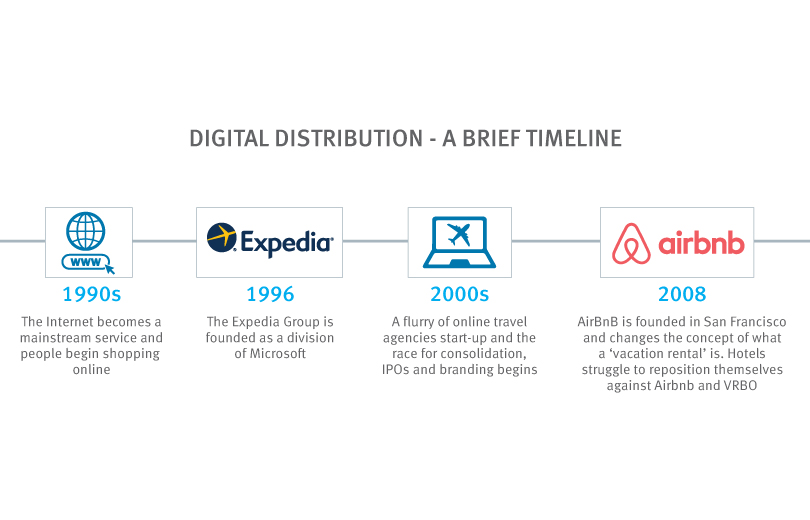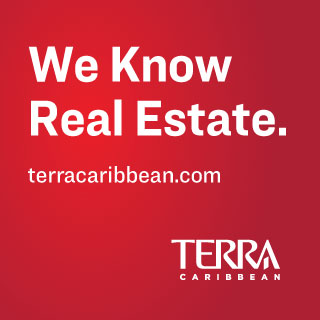Digital Distribution & Villa Rentals
Barbados made its entrance into Vacation Rentals with the wave of the second home market in the mid-90s during the construction of Port St Charles and Royal Westmoreland. At around the same time, the Internet became a mainstream service and e-commerce businesses began to pop up.

Online Travel Agencies (OTAs) have gained market share since their introduction in the mid-90s and currently the five leading OTAs are visited by close to one billion unique users annually. But no other online travel site has changed the face of the vacation rental industry so much as Airbnb.
In Barbados, the percentage of tourists staying in accommodations other than hotels has grown significantly in the past five years. Of note is that the number of listings on Airbnb has grown 70% from 2,330 in 2017 to 3,960 as of December 2019. OTAs like Airbnb have made it easier for property owners to enter the market for tourism accommodation and competition has been fierce.
Hotels have realised the shift in accommodation and reacted by swiftly buying up large tour operators and moving into the vacation rental space. In April 2019 Marriott launched its Homes & Villas programme with 2,000 homes across 100 global markets, including a number of Blue Sky Luxury (BSL) managed villas. Big hoteliers realised that without being responsible for the overheads of operation, it was a market with higher margins and fewer regulatory issues. They are leveraging the marketing power of their loyalty programmes and customer databases and then using local Property Management Companies (PMCs) like BSL to deliver the service.
What has all this meant for Barbados?
With almost no barrier to entry nor government approval required to market a property on an OTA, governments had to play catchup to regulate the market. In the past two years, Barbados has made strides to begin the regulation and registration process. The legislation provides for the registration of all tourist accommodation with Barbados Tourism Product Authority (BTPA) and the introduction of the Shared Economy Levy. The legislation was passed in Cabinet in December 2019 and the challenge now will be to implement and enforce it and harmonise industry definitions across the varying types of accommodations.
Initially there was a lot of confusion around whether the Room Rate Levy and Shared Economy Levy applied to Vacation Rentals but the only applicable levy to Vacation Rentals (whether a condominium or villa) is the 10% Shared Economy Levy. The Barbados Revenue Authority continues to work towards implementing technology to provide for the collection of these levies at the source, to ensure that every property owner is contributing to tax collection and can no longer fly under the radar.
While the legislation has been passed to mandate registration of properties with the BTPA, the full regulations for classification, licensing and standards to be upheld, remain in draft at the time of publishing this article. Once completed, the regulations will outline the minimum standards which tourism organisations need to meet in order to be granted a license to operate. The standards included are service, administration, environmental protection, health and safety and maintenance. The regulations also provide for the ongoing inspection of properties by the government.
To register a property with the BTPA, property owners must follow the following steps or have their PMC handle this process for them. The BTPA will issue confirmation once the application is received and registration completed:
1. Register with the Barbados Revenue Authority through TAMIS (tamis.bra.gov.bb) to receive a Tax Identification Number (TIN) to facilitate the filing of the relevant tourism levy.
2. Complete the online application for the Barbados Tourism Product Authority at:
visitbarbados.org/touristaccommodationregistration
3. Also download and complete the printed application, scan and forward the signed form to the Product Quality Unit at: [email protected]
In recognition of the importance of the sector, the Vacation Rental Management section of the Barbados Hotel and Tourism Association (BHTA) was established officially in 2019. With the new section established, the BHTA is now formalising the varying classes of Vacation Rentals similar to classifications used by the hotels.
Why use a PMC to manage distribution?
While many homeowners have hopped on the OTA train by listing their properties, there are great benefits to having a PMC manage your listings. PMCs have access to not only Airbnb but several OTAs and know the keys to achieving success while listing on these sites. Factors which are important are:
• Knowledge of the algorithms that determine appearance and placement in searches
• Ensuring reviews are being managed and responded to in a timely fashion
• Optimising listing description
• Setting competitive rates with regular reviews to track market movement and capitalising on demand
• Qualifying for programmes like Airbnb’s Superhostsoffers additional advantages like prime placement in search results.
BSL has the advantage from economies of scale, coupled with the necessary staffing to provide dedicated support resources to address any issues quickly. We also have the technology to seamlessly manage rental calendars across multiple channels simultaneously and take secure payments online to facilitate instant booking which is increasingly important in being competitive.
Effective use of OTAs helps to reduce commission costs to owners. Compared to traditional tour operators and travel agents who have historically taken 10-20%, channels like Airbnb, HomeAway, VRBO, and Flipkey will take between 3-5% in commission, while Expedia and Booking.com will take 10-25%.
The commission the channel charges depends on many factors including: whether instant booking is permitted, volume of bookings, payment collection methods, cancellation policy, availability of packages such as accommodation and flights, and location of property. A PMC can negotiate lower commissions than an individual owner. Bookings from channels also give PMCs the opportunity to communicate directly with guests and convert them to direct clients for the future since some channels will charge service fees at up to 15% over the room rates. More direct bookings mean less overall commission paid by owners.
You’ve got a booking…now what?
OTAs have made it easier to market to guests online and achieve a booking, but getting the booking is not enough to sustain a successful vacation rental business. You must be able to deliver the service on the ground, manage the experience and understand your client. In a presentation by Marriott at the Vacation Rental Management Association conference in New Orleans that a BSL team attended in 2019, it was stated, “…the vacation rental customer is not a different customer, but rather an existing customer seeking a different travel experience.” The vacation rental tourist is an experiential traveller: they’re independent, demand distinct types of services and want personalised experiences tailored to them. They want their hosts accessible, but they want their privacy.
There is no doubt that Airbnb and the other OTAs will continue to evolve and drive growth in the industry and it is up to us, as the agents who deliver the service on the ground, to evolve with it.



